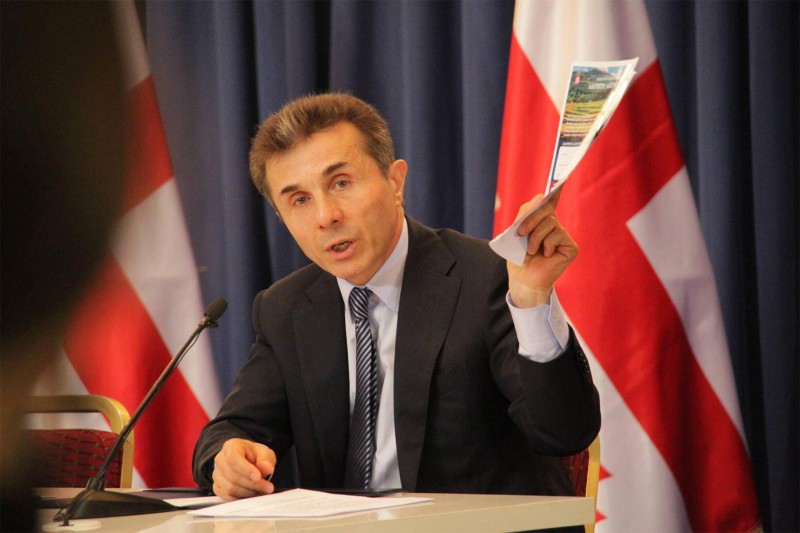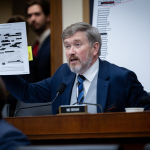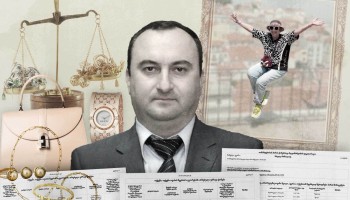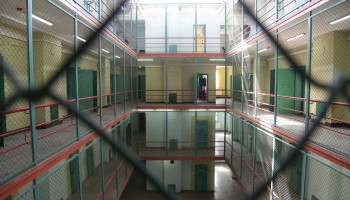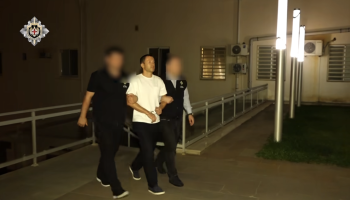Wednesday’s resolution demanded that personal sanctions be imposed on billionaire politician Bidzina Ivanishvili for “his role in the deterioration of the political process in Georgia", as well as for “pivoting towards Russia” and away from the West.
Often described as Georgia’s informal ruler, Ivanishvili founded the ruling Georgian Dream party in 2012 after having made his fortune in Russia in the 1990s. He briefly served as Georgia's prime minister in 2012-2013 before stepping down and taking a back seat in public life.
But after another brief stint as party chairman, he returned to frontline politics as Georgian Dream’s honorary chair in December 2023 and is now the party’s top candidate for parliamentary elections, due to be held later this month.
Critics accuse Ivanishvili’s Georgian Dream of becoming increasingly authoritarian and aligned with Moscow.
The European Parliament’s resolution criticized a raft of recent legal changes in Georgia that Members of the European Parliament (MEPs) claim represents evidence of “democratic backsliding,” describing the measures as “tools” used by the Georgian government to stifle free expression, restrict civil society and target minorities.
It also called for a freeze on all EU funding to Georgia until the Georgian government repeals what MEPs describe as the “undemocratic laws” it has recently introduced.
Chief among them is a divisive “foreign agents” law which requires non-governmental organizations and independent media that receive funds from abroad to register as agents of foreign influence, as well as laws curbing LGBTQ+ rights, including a ban on same-sex marriage, gender transition and adoption by gay and transgender people. MEPs also cited controversial changes to the country’s electoral code.
EU parliamentarians say the measures run counter to Georgia’s aspirations for membership of the bloc and broader “Euro-Atlantic integration.” The EU formally halted Georgia’s EU accession process in June following the adoption of the foreign agents law. Critics of the law say that it mimics Russian legislation used to suppress independent voices in the country.
Whilst MEPs singled out no other individuals besides Ivanishvili for personal sanctions, they welcomed a recent move by the U.S. Treasury to sanction Georgian Dream officials. In mid-September, the U.S. Treasury sanctioned two top Georgian Internal Affairs officials as well as two far-right political activists for their alleged role in using violence against peaceful protests in the country over the past three years.
In their resolution, MEPs called for a “thorough investigation” into allegations of police violence against demonstrators who came out in their thousands in the spring to protest the adoption of the foreign agents law.
Georgian Dream leaders responded to news of the MEPs’ vote with outrage.
The party’s chairman, former prime minister Irakli Gharibashvili, slammed the resolution in an interview with pro-gov Imedi TV as “another insolent interference in [Georgia’s] internal affairs,” criticizing the fact that the vote took place in the run up to hotly-anticipated elections later this month in which the ex-premier is standing as a candidate for Georgian Dream.
Georgians will head to the polls on October 26 to vote in an election that has been billed as a de facto referendum on Georgia’s European aspirations.
At a briefing held at Georgian Dream’s Tbilisi office on Wednesday, the speaker of Georgia’s parliament, Shalva Papuashvili, condemned the vote as “outrageous, shameful, and disgusting,” claiming that “particular forces” were using EU institutions to “attack” Ivanishvili.
Papuashvili further parroted criticisms made by the EU’s ambassador to Georgia, Pawel Herczynski, about Georgian Dream election banners featuring images of destruction from the war in Ukraine, contrasted with peaceful scenes from Georgia, under the captions “choose peace” and “no to war.”
The European Parliament’s resolution deplored Georgian Dream’s use of the images as “a means of manipulating opinions and spreading disinformation and pro-Russian and anti-Ukrainian sentiment” in the run-up to this month’s elections.
“The Georgian Dream party is pursuing a narrative of the West as a ‘global war party’ which is trying to push Georgia back into a war with Russia,” the resolution reads, referencing the 2008 war between the two countries.
The MEPs’ vote fell on the same day as Georgia’s constitutional court ruled not to suspend the enforcement of the foreign agents law – although it did agree to consider its lawfulness within a nine-month period. Georgia’s president, Salome Zourabichvili, together with a group of NGOs and opposition lawmakers, filed a constitutional lawsuit back in July after the Georgian parliament overturned Zourabichvili’s presidential veto of the law and adopted it anyway.
In response to the ruling, dozens of Georgian NGOs signed a statement complaining that the court had missed a “historic chance” to revive Georgia’s EU integration process. The signatories stated that the decision “lack[ed] legal justification” and independence, arguing that the court had submitted to the influence of Georgia’s ruling party.
On Monday, the EU’s delegation to Georgia announced via X that the bloc was pulling €121m ($132.3m) in funding to the country because of “democratic backsliding,” a move that will also see so far unallocated funds from 2022 and 2023 withdrawn.
